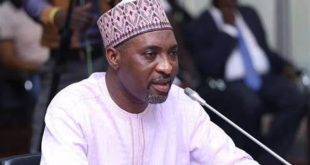By:brightwebtv/nana asare barimah

The Chairperson of the Electoral Commission (EC), Mrs Jean Mensa, has appeared before the Special Budget Committee of Parliament to respond to questions relating to the forthcoming compilation of a new register of voters ahead of this year’s polls.
He appeared before the committee on Tuesday, 16 June 2020 in Parliament.
Mr Haruna Iddrisu told journalists after the meeting that the revelations made by the EC Chair at the meeting were worrying for Ghana’s democracy.
“We have just had some briefing from the chairperson for the Electoral Commission of Ghana, Mrs Jean Mensa. She appeared before the special budget Committee of Parliament.
“Having listened to her, I feel profoundly troubled in my heart for the future of Ghana’s democracy and I feel disappointed that in her answers to questions at the committee-level, she made two significant worrying statements that the people of Ghana must know”, Tamale South MP said.
According to the Minority Leader, Mrs Mensa said the EC intends to phase out the registration exercise in some 6,300 registration centres out of the 33,000 registration centres across the country.
“That troubles my heart because Article 42 will not be observed in essence through making available to Ghanaian people a legitimate and guaranteed right they are entitled to under Article 42. A phased-out registration exercise is not absolute, not countrywide, not in every registration centre and not in their 33,000 gazzeted polling stations, so, it means that the number they are giving today contradicts what has been officially gazzetted”.
“The second matter, which is even more worrying is that she does not seem to understand the essence of data synchronisation and data harmonisation”, Mr Iddrisu said.
“In her answers to a simple question, she stated that they do not intend to use the data of the national identification authority. So, what will they do with the NIA card?”
Recently, Mrs Jean Mensa said acquiring a new voter management system without compiling a new voter roll would mean that the quality of the biometric details of voters would be compromised or completely lost during the migration of those details from the old system onto the new system, thus, the need for a new register to go in tandem with a new voter management system.
Speaking at a forum organised by Friedrich Ebert Stiftung Ghana in Accra, Mrs Mensa said critics have been saying that: “If you are going to buy a new system, buy it; what does it have to do with compiling a new voter register” but noted that: “Experts advised us, right from the outset that in acquiring the new system, you’ll be changing the system operating the biometric voter management system and it meant that you had to migrate the data from the old system to the new system”.
“The result was that you could risk, and we did stand to risk losing a lot of data of citizens who have registered”, she said, adding: “The result would be that you’d go on voting day and your names were missing from the register and this was not a risk that we wanted to take because it meant that several people, and you could not tell who, because as you migrated from the old system onto the new system, you risked losing a lot of data and I can imagine the fury, the uproar that will go on in this country if people go on voting day and their names were not captured”.
She said in the view of the experts, “this was a big risk and we felt that we didn’t want to go forward with this risk”.
“In their view also, the quality of the fingerprints raised issues. The capturing of the fingerprints was poorly done in several instances and even as you migrated, you risked losing even the images, the quality of the images and the result was that you’d end up with high incidence of manual verification, which we have come to observe. And, I mean because the fingerprint quality is so low, when you go on election day and you’re trying to verify, you’d realise that your fingerprint cannot be captured, we cannot verify you using your unique identity which is your fingerprints. What happens then is that, well, you come with a card and we allow you to vote”, she pointed out.
According to her, “This could lead to manipulation in the sense that the card may not belong to you and because we don’t have the feature of facial recognition, you could come in with a card and you’re allowed to vote”.
“And, if there’s collusion at the polling station level, it could lead to a high incidence of manual verification”, she noted, saying: “Indeed, it was something we were beginning to witness and if you look at even the 2019 district-level elections, a litter over 5.4 million persons who were verified to vote, 35,000 of them were manually verified and that’s a significant number if you come to look at the fact that in 2008, the difference between the winner and the runner-up was less than 40,000 and here we are only talking about 5.4 million people who were verified during the district-level election and of that number, 35,000 were manually verified”.
“But if you look at the situation in 2012, the difference between the winner and the runner-up it was less than 40,000. So, this is significant and these are risks. If we really want to ensure the credibility of our elections and ensure that the will of the people really stands, then these are issues of concern that we should look at”.
“And, so the main reason, as I’ve mentioned, for our decision was that changing the operating system, migrating the old data to the new data, you were going to risk losing a lot of data. Secondly, the fingerprints capture was poorly done and it meant that it would even lose its quality and in the end you’d have a biometric register where the fingerprints that you have become useless and a lot more people will be manually verified”, she reiterated.
“The Commission felt that it was important that its foundation document, that is the voter register, was credible and robust. These are some of the reasons that we chose to compile the register”.
Source: ClassFMonline.com
 The Spot Of Latest Trending News And Leaks Log On For Latest Political News, Health Related Issues And More
The Spot Of Latest Trending News And Leaks Log On For Latest Political News, Health Related Issues And More









